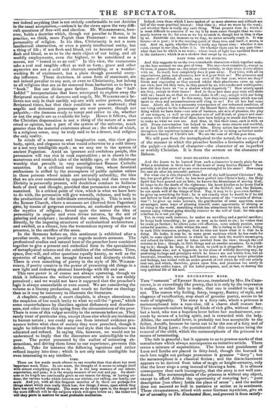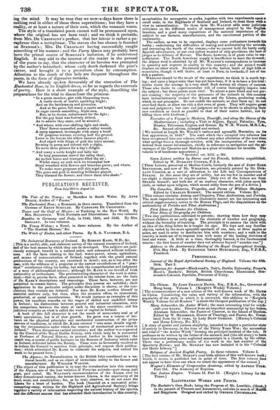THE ENCHANTED ROSE.
THIS it remount" of ERNEST SCHULZE, translated by Mrs. Da Cans- PIGNY, is so exceedingly like poetry, that it is only by the impression it makes, or rather fails to make, that one is enabled to say it is not. The reason why feeling, fancy, imagery, fluency of style, and elegance of versification, stop short of genuine poetry, seems to be want of originality. The story is a fairy-tale, where a princess is metamorphosed into a rose-tree, till a charm shall restore her. Three monarch-suitors bring all kinds of rich gifts, without effect; but a bard, who was a hopeless lover before her enchantment, suc- ceeds by means of a loving spirit, and is rewarded with the lady. Albino, the successful lover, is probably not less acceptable to the father, Astolfo, because he turns out to be the son of a fairy and of his friend King Laon ; the punishment of this connexion being the removal of the child, which the metamorphosis of the princess is a means of terminating. The tale is graceful; but it appears to us to possess marks of that manufacture which always accompanies an imitative article. There seems a mixture of superstitions. The loves and punishment of Laon and Ianthe are placed in fairy-land, though the learned in such lore might not perhaps pronounce it genuine " faery " ; but the metamorphose is a classical fiction; and the disenchantment appears to be derived from tales of magic or knight-errantry, only that the lover sings a song instead of blowing a horn. It is ofmore consequence than such incongruity, that the story is not well con- ducted. The metamorphosis of the princess is without any object, except to afford Albino the opportunity of restoring her; " pure description [too often] holds the place of sense"; and the author does not succeed so well in narrative or action as in sentiment. These circumstances, mixed with some German mysticism, give an air of unreality to The Enchanted Rose, and prevent it from satisfy- ing the mind. It may be true that we now-a-days know there is nothing real in either of these three superstitions; but they have a reality, or at least a nature of their own, which the romaunt wants.
The style of a translated poem cannot well be pronounced upon, where the original has not been read ; and we think it probable, from Mrs. DE CRESPICNr'S preface, that her labour is rather a pa- raphrase than a metaphrase. The stanza she has chosen is founded on SPENSER'S ; Mrs. DE CRESPIGN r having successfully caught something of his manner ; and the Faery Queen may probably have been the primal source of SCHULZE'S imitation, if he understood English. It may add to the interest of the reader in the perusal of the poem to say, that the character of its heroine was prompted by the author's betrothed; whose early death darkened the poet's career, and brought it to a premature close by consumption. Allusions to the death of this lady are frequent throughout the poem, in the form of digressive remarks.
We have already spoken favourably of the execution of The Enchanted Rose, in its English dress, so far as regards the externals of poetry. Here is a short example of the style, describing the preparations for the trial to disenchant the princess.
"In a green meadow, girt with blossoming trees, A castle stood, of marble sparkling bright ; And on the battlements and pinnacles, And at the gates, full many a squire and knight, In eager crowds assembling, Alpin sees, But, as he deems, unharnessed for the fight ; For the gay band was festively attired, As to admire they came, and be admired.
"And where, with ever-shifting light and shade, Tbro' flower-enamelled meads a valley wound, A camp appeared, in wrought with many a braid Of gorgeous texture, covering half the ground. Loose in the breeze the silken banners played; And edged with fringe of gold the tents around, Seeming in pomp and colours rich y-dight, To serve three princes for a day's delight.
"And many a noble knight and ladle fair In long procession moved the valley thro, As mellow horns and trumpets filled the air ; Whilst many an arch with its triumphal bow Stood wreathed with flowers and branches green; and where, To make more gorgeous still this regal show, The gems and gold in dazzling brilliance played, They dimmed the flowers, and threw them into shade."



























 Previous page
Previous page